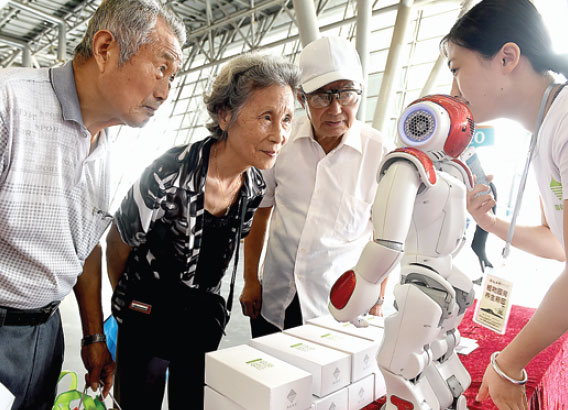Rise of the robots inevitable in China
Updated: 2015-09-14 07:46
By Cheng Yingqi and Shan Juan(China Daily)
|
|||||||||||
 |
|
Visitors examine a robot designed to serve the elderly at an expo in Anhui province, on Aug 14. [Photo/Xinhua] |
Job makers or breakers?
The fact that robots-which don't require air-conditioned offices, paid vacations or frequent salary raises-appear to be ideal employees and few humans can hope to compete with them, naturally raises another question: What if robots perform so well that humans become redundant and unemployment rises?
Industry experts said that such a scenario is improbable. "It's unlikely that there will be a conflict between the installation of robots and employment levels in China in the next five years," Qu Daokui, president of Siasun Robot & Automation Co, said.
Qu said the application of industry robots is limited to only a few fields such as welding, hauling and stacking-repetitive, strenuous manual labor that few people wish to do-so using robots to replace the humans currently engaged in these tasks is unlikely to affect the employment rate.
Statistics released by the International Federation of Robotics shows that the major applications for industrial robots include handling, welding, assembly, dispensing, processing and "clean room" work in dust-free environments.
Although most of the robots are used on automobile production lines (38 percent) and the manufacturing of electronic products (27.6 percent), they are also gradually being adopted by traditionally labor-intensive industries, such as foodstuffs and plastic wares, sectors that have suffered most from the labor shortage in recent years.
"From Germany to South Korea to China, a direct factor in employment has been the economic cycle of a country, not the rising number of robots being installed," Qu said.
Wang Yuechao, director of the Bureau of Major R&D Programs at the Chinese Academy of Sciences, said that based on current technology, robots are unable to perform complex tasks that are currently undertaken by senior skilled workers.
"A six-joint robot is already the most sophisticated thing that engineers can build using the current available technology, but its flexibility doesn't compare with our hands at all," Wang said. "So the range of jobs in which robots will replace humans is too narrow to threaten overall employment levels."
Moreover, a report by the International Federation of Robotics said a prosperous robotics industry could created 1 million to 2 million jobs between 2017 and 2020.
"Our study proves that robots create jobs," said Gudrun Litzenberger, general secretary of the federation, in a written statement.
Related Stories
Robots sparkle at Summer Davos Forum in Dalian 2015-09-09 14:22
Chengdu comes up with a winning game plan 2015-08-31 11:00
Startup energy brings Disney's BB-8 droid toy to life 2015-08-14 13:06
Entrepreneurship to invigorate China's rustbelt 2015-08-11 16:03
2015 intl underwater robot competition kicks off in Lanzhou 2015-07-25 09:23
'Robot supermarket' to open in South China 2015-07-11 14:28
Today's Top News
Refugee crisis: Germany re-imposes border controls
Egyptian security forces shoot at Mexican tourist convoy, kill 12
Thousands flee California wildfire as homes go up in flames
Slow growth may spur more support
British MPs reject assisted dying bill
Chinese nuclear plant may be built in UK sooner than planned
US to accept 10,000 Syrian refugees
China, Arab States to explore cooperation
Hot Topics
Lunar probe , China growth forecasts, Emission rules get tougher, China seen through 'colored lens', International board,
Editor's Picks

|

|

|

|

|

|






